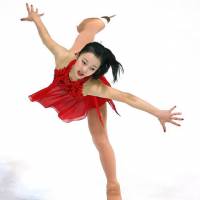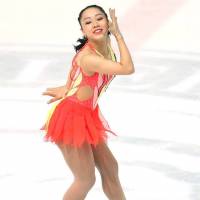Figure skating can be an unforgiving sport.
Just ask last season's teen sensation Wakaba Higuchi.
Higuchi burst onto the scene last year as a 13-year-old during the Junior Grand Prix season, going on to finish third in both the JGP Final and the world junior championships.
Her most impressive feat, however, came at the Japan nationals in Nagano where she took third in the senior women's category behind champion Satoko Miyahara and runnerup Rika Hongo.
The sky looked like the limit for Higuchi, who because of age restrictions had to skate again in the JGP ranks this season. The campaign got off to a rough start for the Tokyo native at her first assignment at the JGP in Linz, Austria, last month.
Higuchi, who will turn 15 in January, came in a disappointing fifth while struggling with back problems. Despite the poor showing, she still had an outside shot at qualifying for the JGP Final in Barcelona, Spain, in December if she could win the JGP in Zagreb last weekend.
She took a narrow lead into Saturday's free skate over Russia's Diana Pervushkina, with compatriot Marin Honda in third place. If Higuchi won the competition, she would get the berth in the JGP Final in a tiebreaker over four other skaters.
When I looked at the starting order for the final group of six skaters and saw that Higuchi was slated to go first and Honda last, I immediately harkened back to the 1998 Nagano Olympics and the women's free skate.
The situation was similar in that favorite Michelle Kwan, the leader after the short program, was skating first and teammate Tara Lipinski last. Kwan ended up skating a conservative program and despite taking the lead, lost to Lipinski's technically superior effort.
History repeated itself in Croatia on Saturday night, with Higuchi taking the lead with a solid effort, only to see Honda pull off the free skate of her life and snatch away the gold.
How good was Honda's free skate on Saturday?
She surpassed her previous career-best score (95.39) in the free skate by nearly 28 points (123.30) with a spectacular effort that gave her a comfortable six-point win over Higuchi.
Honda's total score was 181.22, while Higuchi tallied 175.06.
Higuchi was done in by her next-to-last jump, a planned triple flip that she singled. That left the door open for Honda and she walked right through it.
Skating with confidence and real maturity, Honda was clean from start to finish and did not earn a single negative mark from the nine judges. Her program component score of 67.81 was better than any of the senior women skaters at last season's worlds and just slightly below the mark of training partner Yuna Shiraiwa (68.12) in winning the JGP in Logrono, Spain, two weeks ago.
Honda, a 14-year-old from Kyoto, landed seven triple jumps and also got top marks for her spins in the victory where she performed to the soundtrack from "Beetlejuice" in a sharp red-sequined outfit.
If somebody had said after last season that Higuchi would not make this year's JGP Final, you could have gotten pretty good odds against that. If you were told there would be three Japanese women in the field and she wouldn't be one of them, the odds would have been phenomenal.
But this is what has happened and the finality of it set in during the medal ceremony in Zagreb when Higuchi came unglued and wept openly the entire time. At one point, Honda, standing atop the podium, reached down to wipe a tear off Higuchi's face.
Higuchi's reaction to placing second was a reminder that at 14 she is still a youngster and should be regarded as such. These kids are expected to perform like adults at these events and face big pressure. Sometimes they just can't handle it.
I think Higuchi's tears were those of frustration. I was reminded of a prominent former skater telling me several years ago how three-time world champion Mao Asada was having trouble with one of her combinations at practice and got so upset that she left the ice and cried nonstop for 30 minutes.
It's all part of the growing process and hopefully Higuchi will put this setback behind her quickly and learn from it.
As if matters were not tough enough for Higuchi, she is not even Japan's first alternate for the JGP Final. That honor went to Kaori Sakamoto, who will join the field if one of the skaters has to pull out.
The triumph by Honda marked the second week in a row that a skater coached by Yamato Tamura and Mie Hamada has really torn it up at a JGP. Shiraiwa did it in impressive fashion in Spain to book her ticket to the JGP Final, where she and Honda will be joined by Mai Mihara (who took second place in her two JGPs this season).
It will be Japan vs. Russia in the women's JGP, as Shiraiwa, Honda and Mihara will take on Polina Tsurskaya, Maria Sotskova and Alisa Fedichkina in the six-skater field.
Sota Yamamoto will be Japan's lone representative in the men's event at the JGP Final. Yamamoto finished first and third in his two JGPs this season.
Tuning up: Hongo, who was sixth at last season's worlds, won the Grand Prix season warmup Finlandia Trophy in Espoo, Finland, over the weekend by a decisive margin over Julia Lipnitskaia. Hongo totaled 187.45, while the Russian finished with 172.33.
The event is part of the ISU's Challenge Series, which is ranked below the GPs. Miyahara, the silver medalist at the worlds, won the U.S. stop on the tour in Salt Lake City last month.




















With your current subscription plan you can comment on stories. However, before writing your first comment, please create a display name in the Profile section of your subscriber account page.